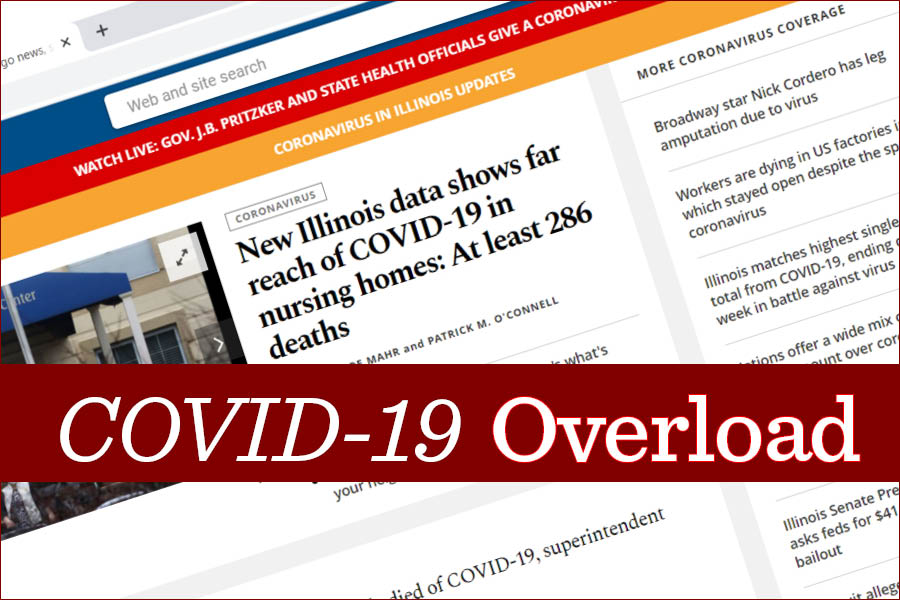Amid COVID-19 pandemic, students maintain connections and productivity
April 19, 2020
The COVID-19 pandemic has scattered U-High students across the city and even to other states. However, students have still found ways to maintain personal connections and stay productive during remote learning.
Sophomore Keara Booth and her family decided to stay at their lake house in Wisconsin during social distancing.
“I’ve been self-quarantining for a while and only really interacting with my family which is not really difficult because I’m away from my friends in a different state, but I think it would feel worse to be in Chicago close to my friends but unable to hang out because of COVID-19,” Keara said.
School counselor Camille Baughn-Cunningham suggests students take advantage of their time at home with their families.
“I would encourage all of us, students and adults alike, to be thinking about ways in which they can kind of optimize time and space with the people that they are in their homes with,” she said.
To help fill the extra time, Dr. Baughn-Cunningham suggests setting a routine and having anchors every day to maintain a sense of normalcy.
“I would say it’s helpful when we’re dealing with a time of stress and the anxiety that comes with that and a lot of uncertainty, is to have a routine that you fall back on,” Dr. Baughn-Cunningham said. “What are some important anchors in your days and in the course of your week that you can really rely on? And some of those anchors and kind of familiar touching points might be some of the time with people so it can tie into isolation and things that you can do to be less isolated.”
Junior Aanika Atluri has found remote learning to be a good time to revisit old passions and projects.
“I’m limiting social interaction quite a bit. I’m not allowed to visit my friends and can only go outside with my family,” Aanika said. “It’s been somewhat difficult, but I’ve been spending more time with my siblings and have had the time to work on projects that I have been pushing to the side because of schoolwork, such as astronomy and astrophotography.”
Staying connected with friends and family during remote learning and social distancing is also important, according to Dr. Baughn-Cunningham.
“Things as simple as making sure that you have a family meal together. If that can’t be dinner, perhaps it’s having breakfast or brunch together,” she said. “So, having at least one meal or some other kind of activity around which you can connect with whoever’s in your household, I think is helpful.”
Dr. Baughn-Cunningham also suggests limiting contact with stressful things like news updates related to COVID-19. She also suggests making sure to have light and happy moments in your day.
“Humor and laughter are always important,” Dr. Baughn-Cunningham said. “But, I think it’s really been important during these times where things feel so heavy to kind of find something silly and funny, whether that’s one of your favorite comedic movies or whether that’s a site that has silly stuff that you enjoy on it, and just taking a break from the work and laughing for a while.”
When working from home it is important to create a separation between work and home according to Dr. Baughn-Cunningham.
“I know that there are probably a lot of students who are working, if not in their bedroom, maybe even on their bed,” Ms. Cunningham said. “And I think that’s a hard habit to break. But if you can, to really set up a workspace that isn’t also in the space that you’re sleeping and hopefully relaxing, and really getting good quality sleep.”
According to Dr. Baughn-Cunningham, counselors are supporting students in a number of ways.
“Counselors are posting a weekly lesson on Schoology on each of the classes, Schoology pages, things that we hope are providing some balance to the work that we know you’re getting from your teachers,” she said.
Additionally, Ms. Cunningham said that counselors are available for appointments with students during the day.
To reduce stress and anxiety, Ms. Cunningham suggests a number of strategies.
“Keeping a balance, having a routine, limiting things that are stressful, and focusing on things that we can control. That’s another element, as opposed to all the things that right now we really can’t control.”




























































